Francis Ngannou's Sports Injuries
Type of Sport: Mma
Francis Ngannou's Sports Injuries Table
| Type | Area | Date | Consequences | Content | How It Happened | Recovery Duration | Rehabilitation Details | Impact On Career | Psychological Impact | Previous Injuries | Return To Competition | Severity | Treatment | Medical Staff | Long Term Impact | Preventive Measures | Competition Missed | Initial Symptoms | Re Injury Risk | Support System | Rehabilitation Location |
|---|---|---|---|---|---|---|---|---|---|---|---|---|---|---|---|---|---|---|---|---|---|
| Hand Injuries | right hand | 2018-07-06 | Significant pain and difficulty in making a fist. | Ngannou sustained a right hand injury during his fight with Derrick Lewis. The injury affected his performance and contributed to his unanimous decision loss. | Injury occurred during the fight against Derrick Lewis at UFC 226. | 4-6 weeks | Rest and physical therapy focusing on hand mobility and strength. | Short-term impact, but returned to competition shortly after. | Frustration due to performance impact. | None reported in the same area. | 2018-11-24 | Moderate | Rest, physical therapy, and anti-inflammatory medications. | UFC medical team, personal physiotherapist. | No significant long-term impact reported. | Improved hand protection during training and fights. | None, fought with injury. | Pain, swelling, and difficulty in movement. | Low, with proper precautions. | Team, family, and medical professionals. | Las Vegas, Nevada. |
| Knee Injuries | left knee | 2022-01-21 | Limited mobility and significant pain. | Francis Ngannou suffered a left knee injury during his training camp leading up to his fight at UFC 270. Despite the injury, he managed to secure a victory. | Injury sustained during training camp for UFC 270. | 8-12 weeks | Intensive physical therapy focusing on knee stability and strength. | Temporary setback, but returned to competition successfully. | Increased mental toughness and determination. | Right knee injury in 2021. | 2022-07-02 | Severe | Rest, physical therapy, possible surgical intervention. | UFC medical team, personal physiotherapist, orthopedic specialist. | Potential for chronic knee issues, closely monitored. | Enhanced knee support and strength training. | None, fought with injury. | Severe pain, swelling, and restricted movement. | High, requires careful management. | Team, family, and medical professionals. | Las Vegas, Nevada. |
| Knee Injuries | right knee | 2021-03-26 | Difficulty in movement and significant pain. | Francis Ngannou suffered a right knee injury during his training camp leading up to his fight at UFC 260. Despite the injury, he went on to win the fight. | Injury sustained during training camp for UFC 260. | 6-8 weeks | Physical therapy focusing on strength and flexibility exercises. | Temporary setback, but returned to competition successfully. | Increased mental resilience and determination. | None reported in the same area. | 2021-06-27 | Moderate | Rest, ice, compression, elevation (RICE), physical therapy. | UFC medical team, personal physiotherapist. | Potential for future knee issues, but currently managed. | Enhanced strength training and flexibility routines. | None, fought with injury. | Swelling, pain, and restricted movement. | Moderate, depends on future strain on the knee. | Team, family, and medical professionals. | Las Vegas, Nevada. |
Francis Ngannou's Sports Injuries Videos
Francis Ngannou Doesn't Need an MCL or ACL: Doctor Reacts to UFC 270 Knee Injury News
Francis Ngannou retained his heavyweight belt at UFC 270 and revealed he fought with a completely torn MCL and an injured ACL. Dr. Brian Suter explains the severity of these injuries and their impact. He clarifies that while MCL tears rarely require surgery unless completely torn, ACL injuries can sometimes be managed by muscle support, particularly from the hamstrings. Despite the injuries, Ngannou's toughness and determination exemplify the resilience often seen in combat sports athletes.
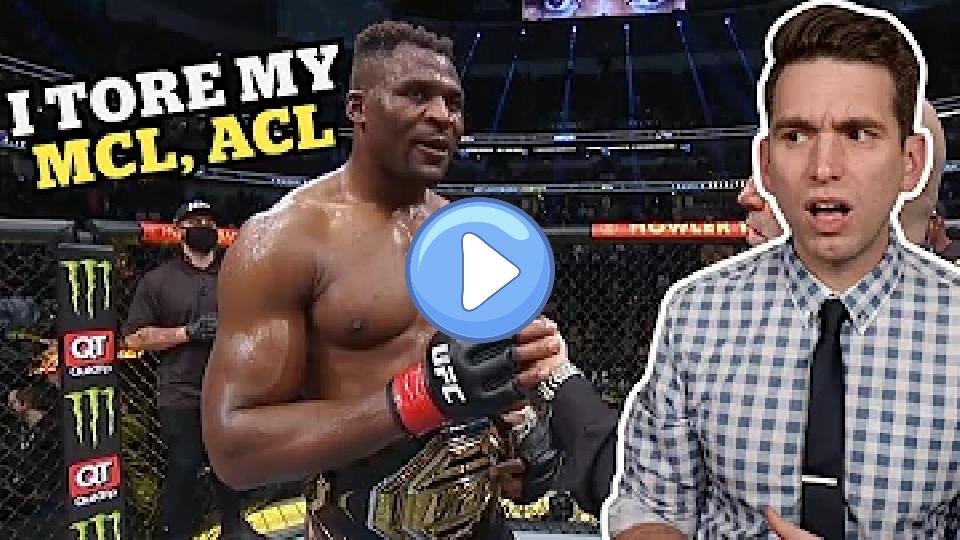
My Injury: I'm Telling You Everything! | Francis Ngannou
At UFC 270, I retained my UFC Heavyweight title against the then-undefeated Ciryl Gane. However, during a sparring session, I twisted my knee and heard a crunch, indicating a serious injury. Despite the bad MRI results, I pursued stem cell treatment and extensive rehab to recover in time for the fight. Mentally, I drew inspiration from Kamaru Usman's resilience. The injury affected my performance, especially in the first two rounds, but also strengthened my mental resolve. My recovery process involves surgery in early March, with a potential return to full training in six to nine months. My goal is to face Tyson Fury, regardless of my contract situation with the UFC.

Road to Recovery: It Starts Now! | Francis Ngannou
Despite my injury, I won in a tough fight against Ciryl Gane last January. Now, before thinking about my comeback, I need to focus on my recovery. My knee was very swollen, and we've been working to reduce the swelling, which is necessary for the pain to subside. My quad has lost muscle mass, so I’m doing exercises to strengthen my calf and hips to support the non-functional ligament.
Nineteen days post-surgery, they removed the stitches, and everything looks good, though it doesn’t feel great yet. The swelling prevents much movement, but my knee is less swollen than yesterday. They took my patellar tendon, placed screws in my femur and tibia, and reconstructed my MCL. The ACL, however, cannot heal itself.
The injury happened on December 28th, like a car accident—you can't miss it. My foot got stuck on the canvas, and I felt my knee pop. Despite this, I fought afterward without a cortisone shot to avoid interfering with the stem cell treatment, even though it didn’t help the pain.
Rehabilitation focuses on strengthening muscles, using a hyperbaric chamber daily, and ensuring the quads are firing correctly. This is my first serious injury, and I hope it's the last. Regular fights usually don’t result in such severe injuries. Recovery involves getting everything working properly again, especially the hips and quads. The gym isn’t fun, but it’s necessary for recovery.
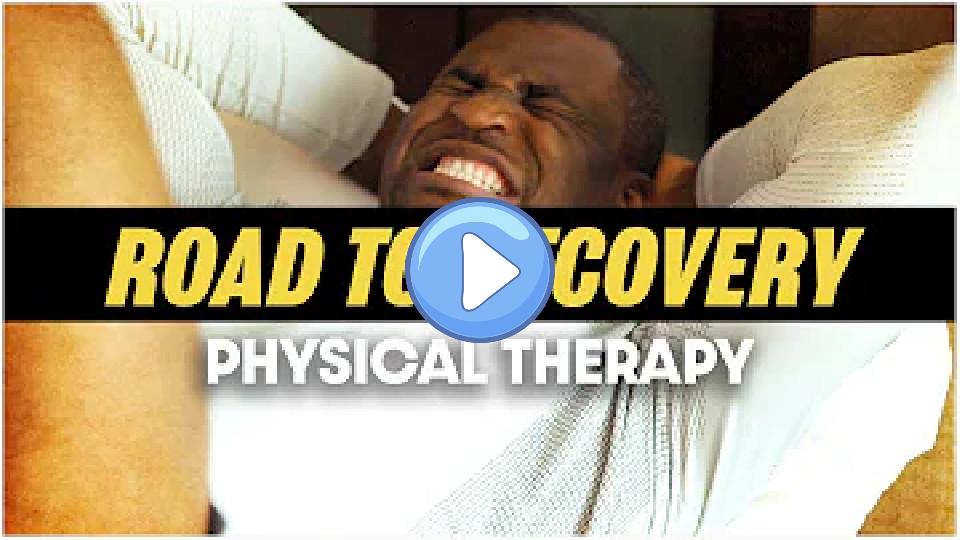
Expert Explains Francis Ngannou's Knee Injury, Timeline & Tactics for UFC 270
UFC heavyweight champion Francis Ngannou defended his title at UFC 270 despite dealing with a significant right knee injury. Ngannou suffered a grade 3 MCL rupture, ACL damage, and MPFL damage 25 days before the fight. To compensate for the loss of stability from these injuries, Ngannou relied on muscular support and neuromuscular stability. He also made tactical changes, such as avoiding stance switches and reducing the effectiveness of his striking to protect his knee. Instead, he focused on wrestling and grappling to leverage his upper body more than his legs. Ngannou mentioned the need for surgery, with recovery timelines varying depending on the extent of the injuries. The MCL injury typically requires a three to four-month recovery, while ACL surgery could extend recovery to nine months or more. The long-term impact of fighting through the injury remains uncertain, but it could lead to lingering issues. Ngannou's competitive mindset and determination were evident in his performance.
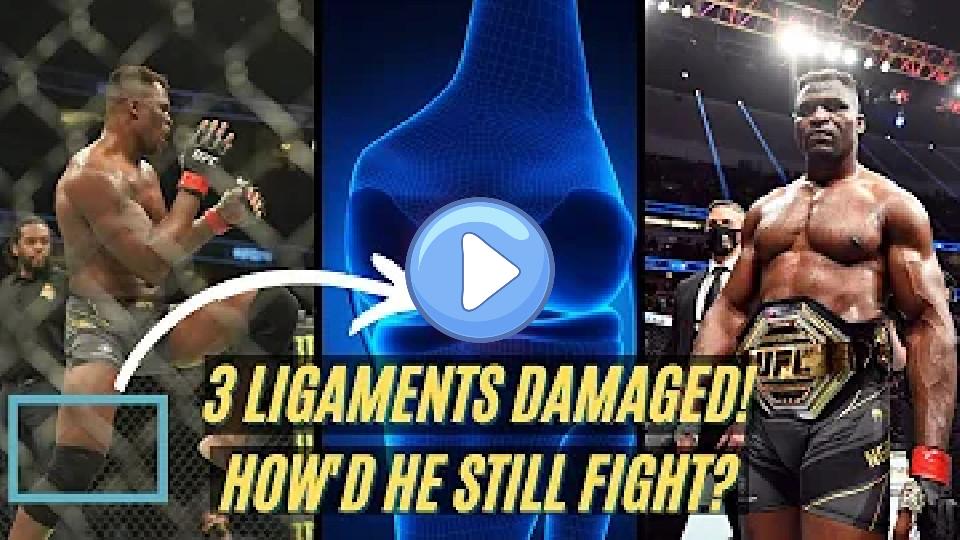
Francis Ngannou reveals a knee injury that nearly pulled him from UFC 270 | ESPN MMA
Francis Ngannou spoke with Megan Olivi about his victory over Ciryl Gane at UFC 270. Ngannou revealed that he had been dealing with a knee injury, including a grade three MCL tear and damaged ACL, three and a half weeks before the fight. Despite considering withdrawing, he decided to proceed with the fight. Ngannou mentioned his confidence in his grappling skills, which played a crucial role in his victory. He expressed satisfaction in showcasing his evolution as a fighter and emphasized the hard work he put in at the gym. Ngannou is uncertain about his next steps but remains open to future opportunities.
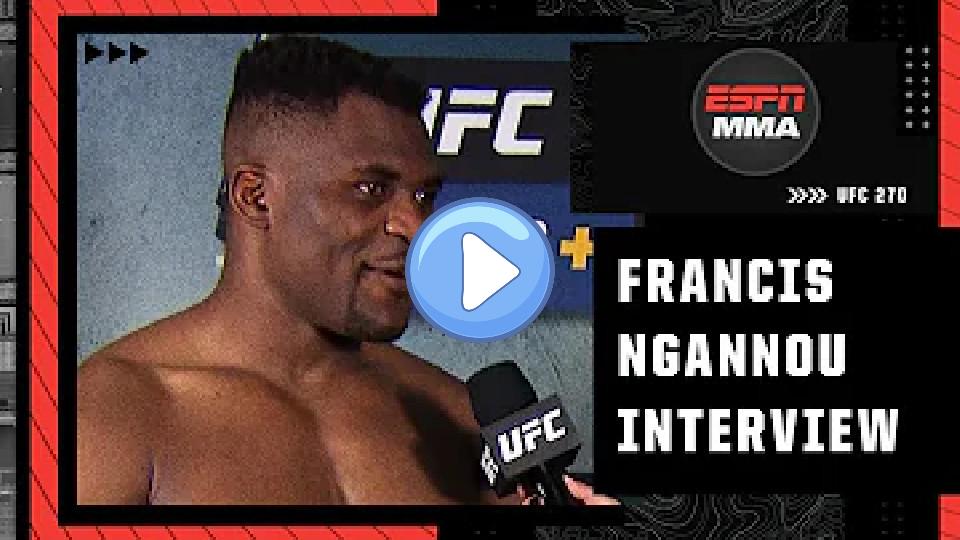
Francis Ngannou shows off incredible kicking power in injury recovery update: ‘It feels damn good’
Subscribe for daily MMA news: [link]
Follow us on Facebook: [link]
Website: [link]
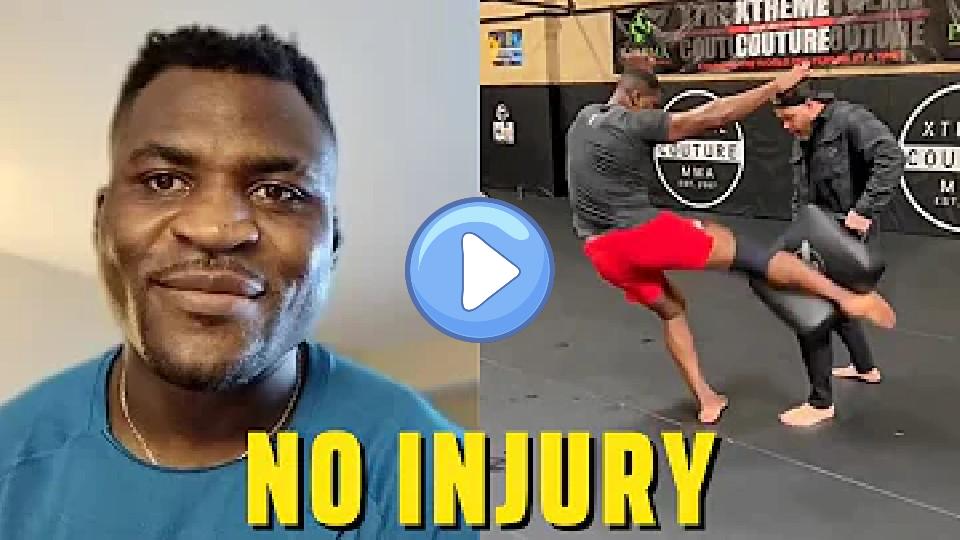
Francis Ngannou suffers a brain injury from the match with AJ in Saudi Arabia. @YouTube
Francis Ngannou suffers brain injury. @YouTube #500subs #WBO #Riyadh #LightHeavyweight @TysonFury
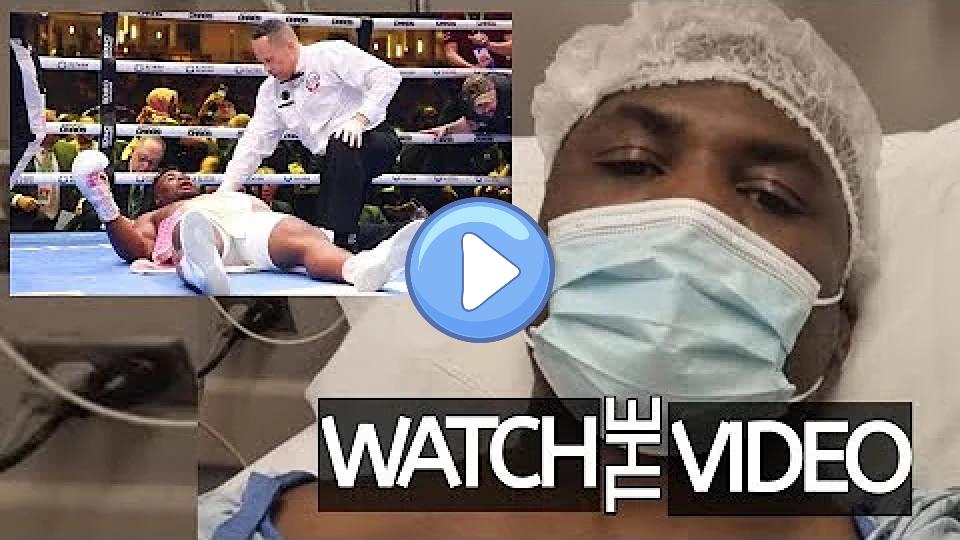
Road to Recovery: Hard Work Continues | Francis Ngannou
Francis is four weeks post-op from ACL and MCL surgery. His recovery is progressing well, focusing on strengthening his quad, glutes, and hamstrings, along with improving balance and proprioception. He has transitioned from crutches to walking unaided and is now able to bike, aiming to tackle stairs and more functional tasks. He is advised to stay active during long flights to prevent swelling. His rehab involves two daily sessions focusing on strength, balance, and soft tissue work. Various recovery tools are being used, such as infrared and laser therapy, to aid healing. Francis is optimistic about his progress, able to walk and drive, and plans to gradually resume training in the coming months, taking care not to rush the process to avoid setbacks.
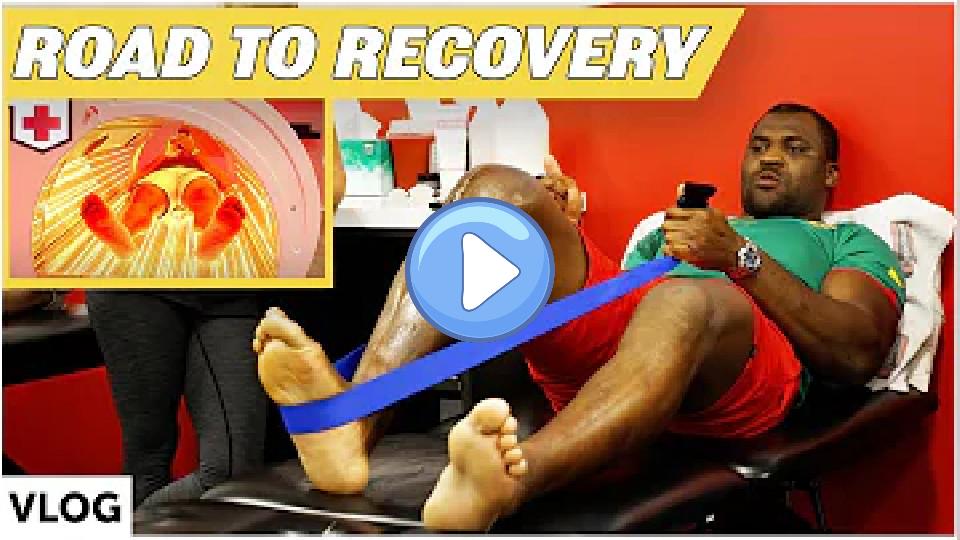
Francis Ngannou: Fought on Injured Knee, I Would Have Left My Leg in the Octagon
Francis Ngannou addresses having fought on an injured knee, despite a doctor not being optimistic and saying it could cause irreversible...

